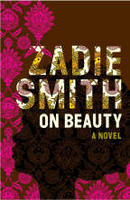Post Number Ten*

*On Beauty
Finished one of the most talked about books of 2005 (which is also short listed for The Man Booker Prize, to be announced today). She’s quite the celebrity of literature, whether because of her comments about Britain in a recent interview or her good looks or her weird case of mistaken identity.
Whatever the subject, Zadie Smith is regarded as an undeniably talented writer. I swallowed On Beauty over the weekend, and was delighted to find that it lived up to the hype in the most gratifying and surprising way. The language is quick and intelligent. Although at times she stumbles over American dialogue, it was quickly forgiven since more often than not she was pretty spot on. What I admired most about Ms. Smith was her ability to write an amazing cast of multicultural characters, without sticking to cardboard clichés found in so many books lining the shelves today. The ability to write about race as it is, spanning class lines and ideological views is one of her greatest gifts, and although race is by no means the focus of this book it plays an integral part in understanding the way the characters react to the world around them.
Some reviewers have remarked that On Beauty is a novel of ideas, which is to say it wears them on its sleeve as opposed to fiction whose ideas are more imbued or implied. That description, however, takes the treatise-like title too seriously and shortchanges the Belseys’ explosive confrontations and inner-turmoil, exposed in simple, delicate layers. Smith does raise debated ideas—freedom of speech, affirmative action, critical theory, and more abstract principles like beauty and justice—at pivotal turning points but does not flesh out their contested aspects in great detail. Smith’s intelligence and talent lie in her ability to empathize and think through feeling; therefore, thankfully, the book expects readers to emotionally graph the issues and not analyze them as intricate, ideological wallpaper against which the action occurs. The true novel of ideas is much more politicized than On Beauty, which, like Kiki, does not dive headlong into the political but wades into the shallow end.
As Kiki makes clear, despite questions from the outside of the marriage looking in, the book is primarily a novel of situational characterization and social as well as class differences. Race, of course, is a fundamental part of the novel, but it is secondary to other degrees of difference—a refreshing variation on a theme when labels and classifications in fiction are all the fashion. In certain ways, Smith’s characters are more authentically black because they inhabit a novel whose class borders are fluid. Racial identity is explored and preserved not because they encounter a spectrum of social and class difference but because they have been enhanced by it.
Via The Simon as reviewed by Alan Williams.

0 Comments:
Post a Comment
<< Home